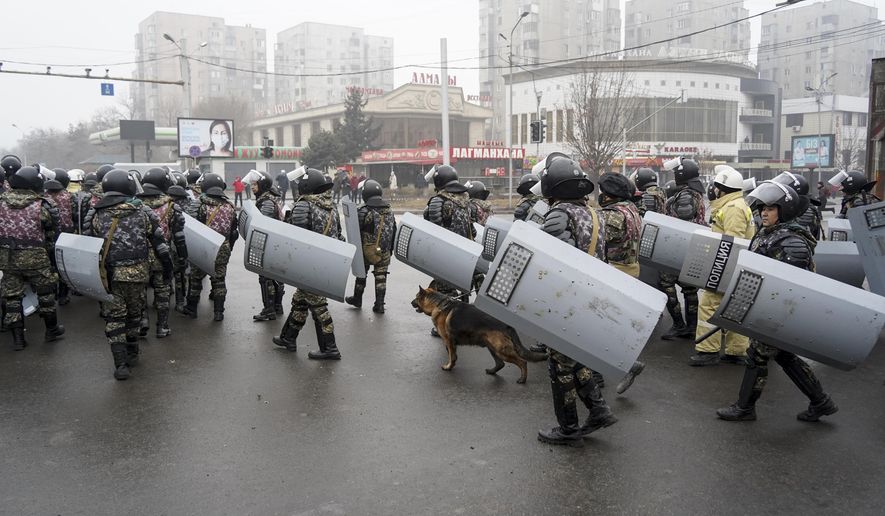A top Kazakh opposition figure claims Russian forces have effectively launched an “occupation” of Kazakhstan, with Russian President Vladimir Putin pushing toward the goal of enveloping the Central Asian nation into a Moscow-controlled order akin to the former Soviet Union.
Mr. Putin, who has deployed Russian paratroopers and other forces to help crush protests in Kazakhstan during recent days, will succeed in the goal unless Western powers wake up and confront him, says Mukhtar Ablyazov, the head of a Kazakh opposition group called the “Democratic Choice of Kazakhstan.”
Mr. Ablyazov, a former Kazakh banker and government minister living in exile in France, presented the warning in an exclusive interview published Friday by Reuters.
While he did not specify whether or not he believes Western powers should use force, Mr. Ablyazov told the news agency broadly that the West must take stock of what’s happening and halt the Russian advance.
“If not, then Kazakhstan will turn into Belarus and Putin will methodically impose his program — the recreation of a structure like the Soviet Union,” Mr. Ablyazov told Reuters in Russian from Paris. “The West should tear Kazakhstan away from Russia.”
“Russia has already entered, sent in troops,” he said.
Russian forces began moving in at the request of Kazakhstan’s authoritarian President Kassym-Jomart Tokayev as part of a regional peacekeeping force organized by the Moscow-dominated the Collective Security Treaty Organization. But Mr. Ablyazov told Reuters that Moscow is actually running the show.
“CSTO is Russia,” he said. “This is an occupation by Russia.”
His comments come at a moment of uncertainty among U.S. policymakers over how to respond to the violent chaos unfolding in Kazakhstan, an often unnoticed but strategically vital Central Asian nation that shares lengthy borders with Russia and China and operates as a key hub for U.S. oil companies in the region.
Kazakh security officials, aided by the Russian forces, appeared to have established a measure of control in Almaty and other major cities Friday after nearly a week of violence and unprecedented public demonstrations against the government.
The relative calm came after Mr. Tokayev gave security officials a standing shoot-to-kill order to deal with protesters and blamed the crisis on “bandits” and unnamed foreign-backed terrorists. Russian troops helping put down the protests are part of a first deployment ever dispatched by the CSTO, which the Kremlin and some news reports have described as a regional security alliance. Troops from Belarus are also reportedly in Kazakhstan and Armenia, Tajikistan and Kyrgyzstan are expected to arrive soon as well.
Some analysts believe the crisis gives Mr. Putin another chance to assert Russia’s preeminence in its strategic neighborhood and gain more leverage over the Tokayev government.
The developments are unfolding against a backdrop of growing Russian attempts to exert influence over other former Soviet republics, including Belarus, all while the Putin government engages in a major troop buildup on the border of nearby Ukraine — a move that has sparked fears that a Russian invasion of Ukraine may be imminent.
Protests in Kazakhstan began a week ago in the western part of the vast country against a sharp rise in fuel prices, the demonstrations quickly engulfed Almaty and cities across the landlocked Central Asian country. Many protesters demanded broader political reforms and the sidelining of longtime former President Nursultan Nazarbayev, still a dominant behind-the-scenes figure despite stepping down as president in 2019.
Internet and messaging services have been mostly cut off since the protests began, making it hard to gauge the full extent of the violence.
Kazakhstan’s Interior Ministry said Friday that at least 26 protesters had been “liquidated” and 18 government security forces had died in the clashes in Almaty, which included pitched battles and gunfire in the heart of the city. More fatalities are likely in clashes in provincial cities in recent days.
The Biden administration has called for calm and accused Moscow of promoting a false narrative that American officials are to blame for the unrest, which has been building for days. “There are some crazy Russian claims about the U.S. being behind this,” White House spokesperson Jen Psaki said on Wednesday.
“That is absolutely false and clearly a part of the standard Russian disinformation playbook,” she said. She told reporters that the administration “support[s] calls for calm, for protesters to express themselves peacefully and for authorities to exercise restraint.”
Mr. Ablyazov, meanwhile, told Reuters that he sees himself as “the leader” of Kazakhstan’s opposition. The news agency reported that he served in the Nazarbayev government as energy minister in the 1990s before his relationship with Kazakh authorities soured. He was later granted refugee status in France, where he now lives.
Mr. Ablyazov, 58, was sentenced in absentia in Kazakhstan for fraud, embezzlement and for organizing a murder, charges he denies and says were politically motivated, Reuters reported. Kazakh authorities have accused him of instigating and bankrolling previous protests in 2016 that forced Mr. Nazarbayev to delay unpopular land-ownership reforms.
“I see myself as the leader of the opposition,” Mr. Ablyazov told the news agency. “Every day the protesters call me and ask: ‘What should we do? We are standing here: What should we do?’”
Correction: An earlier version of this story misspelled the first name of President Kassym-Jomart Tokayev. The article also misspelled the last name of Mukhtar Ablyazov in one reference.
• David R. Sands contributed to this story.
• Guy Taylor can be reached at gtaylor@washingtontimes.com.




Please read our comment policy before commenting.